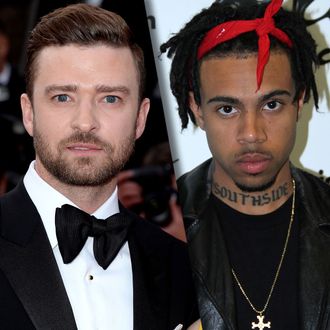
Last weekend, the annual Pride celebrations and the BET Awards hit on the same summer Sunday evening, as they often do, and incidents arose out of each event that illuminated a need for keener, more informed social-justice advocacy from stars in and around hip-hop. One of the BET show’s highlights was activist and Grey’s Anatomy actor Jesse Williams’s Bet Humanitarian Award acceptance speech, in which he spoke sharply and passionately about the fight against systemic racial inequality. After the show, Justin Timberlake ended up under fire on Twitter after handling a sharp retort to his quick message of support for Williams’s speech with a cavalier snap. The same night, Chicago rapper Vic Mensa released a new song called “Free Love” to stand in support of LGBTQ rights and a family member who came out to him last year. Like Timberlake’s gaffe, Vic’s song is a stutter step toward enlightenment where a great stride was needed. Both artists are aware of inequalities they’ve escaped since birth, but each struggled to speak sensitively and articulately about the privileges of whiteness, maleness, and straightness when put on the spot.
To understand the ire for Justin Timberlake, it helps to look back on the stormy aftermath of the 2004 Super Bowl XXXVIII halftime show, where Janet Jackson brought Timberlake out as her guest, and a wardrobe malfunction revealed her breast on national television. Jackson was forced by CBS to apologize on camera, banned in perpetuity from the Super Bowl, and squeezed out of the same year’s Grammys, while Timberlake shouldered very little backlash for his part. Many came to see his continued prosperity in R&B as a product of a cocktail of cultural appropriation and white privilege: He profits from black music, the complaint goes, without bearing any consequences or committing to hard social stances because of it. The condescending tone in the singer’s Sunday-night tweet brought these feelings home to roost and derailed an otherwise quaint gesture of cross-race solidarity. Timberlake could’ve coasted on a moment’s patience and a little reading, but it became immediately apparent in his actions that he doesn’t quite grasp his prickly reception in the black community or the speed of critical thought — and outrage — on Twitter in 2016.
Vic Mensa was much more careful. The group of guests “Free Love” touts includes the proudly bisexual pop singer Halsey and Le1f, a New York rapper whose fearless exploration of male sensuality and desire keeps him a few degrees removed from hip-hop’s mainstream and pigeonholed as a “gay rapper” by media looking for a quick explaining hook — and Vic premiered the song at a gay Pride event at Chicago’s Smart Bar. His strides toward inclusivity are respectable but his message needs fine-tuning. The rapper trails off script mid-song in a verse that invokes Bill Clinton’s marital infidelity and the cannibalism of serial killer Jeffrey Dahmer while musing about whether a state official overseeing North Carolina’s transphobic bathroom bill has “some skeletons in the closet of his own bedroom.” The song rightly questions the nerve of a country with an extensive collection of heterosexual crooks to single-out sexual orientation and gender identity as acceptable grounds for discrimination. But Vic’s “Let’s be honest: Nobody out here’s really innocent” barb isn’t the right ministry. Marginalized groups deserve equality because of our shared humanity, not because people in power are just as broken as they wrongly perceive others to be. “Free Love” needed to level homophobia and transphobia, not level with them.
Still, Mensa’s mind appears to be working in ways it’s not so easy to say Timberlake’s is. “Free Love” shows a young rapper making inroads to understanding. Justin, on the other hand, is reacting to criticism with snark and ducking for cover when further challenged. It’s hard to know how to be there for a community whose struggles are not your own, and no one is born a sharp race and gender theorist. But an artist’s obligation to their audience doesn’t end at the edge of the stage in 2016. Singing and dancing away your fans’ troubles won’t suffice. In a world that looks increasingly to entertainers to be at least sympathetic to the sociopolitical struggles faced by their fan bases, patience, grace, and outreach are imperative. This year will continue to bring hell to anyone too wrapped up in their status to think outside it.


